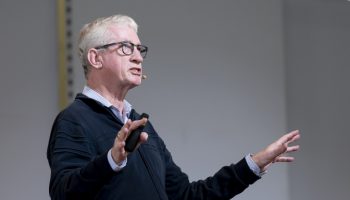For Cathrael Kazin, the future of learning is the future of work.
“There are so many discussions in the higher-ed community, even among people who are interested in reform of higher-ed, that take place without any reference to the future of work,” Kazin said. “It seems to me that the two conversations have to happen together so that post-secondary education, in general, will help people and our society meet these unimaginable challenges.”
 Kazin will discuss challenges facing higher education and new methods for learning at the 10:45 a.m. morning lecture Tuesday, July 31, in the Amphitheater to continue Week Six’s theme, “The Changing Nature of Work.”
Kazin will discuss challenges facing higher education and new methods for learning at the 10:45 a.m. morning lecture Tuesday, July 31, in the Amphitheater to continue Week Six’s theme, “The Changing Nature of Work.”
An expert on competency-based learning and assessment, Kazin serves as managing partner of Volta Learning Group; Volta designs new learning and credentialing strategies for industries.
Most of Kazin’s work is focused on adults — the new college student.
“(College students are) adults, a third of them are parents, a lot of them are really poor; they aren’t residential students, they’re not on campus; they may be learning online or through hybrid (models),” she said. “They’re not going to selective institutions.”
Kazin attributes the changing model of the college student to two factors: evolving technology and shifting demographics.
“We know that the technology we have today has changed vastly … and yet, higher education still acts as though that seminal experience when you’re 18 to 22 is supposed to prepare you for the changing world,” she said. “Everything we know about technology is that the rate of changes is exponential, but we are still content to have this very slow and laborious and risk-averse approach to learning.”
Aside from technology, demographics of college students are changing; the traditional 18-to 22-year-old is not the majority of most college students, in fact, that student is becoming “sparser and sparser,” Kazin said.
“The learners that really need access to higher education — they are people of color, they are adults, they are working,” she said. “That model in which you are supposed to leave your life for four years or six years and then be in debt for the rest of your life, that actually isn’t going to work for that many people anymore,” she said.
A model Kazin sees advancing post-secondary education is one she established as chief academic officer of College for America at Southern New Hampshire University. Her award-winning, competency-based curriculum centers around projects, not exams.
This is not the first education-workplace revolution, Kazin said. The Industrial Revolution saw changes in education with the move from home- based work to factory production lines.
“Along with that factory model came a lot of ideas about efficiency and uniformity,” she said “… Some of these ideas actually infected higher education, like children sitting in rows (of desks).”
In the present day, Kazin said, the onset of the distributive workplace — where people may work from home on a computer or in a call center—is changing work, and education hasn’t kept up. According to Kazin, 95 percent of chief academic officers and provosts think their schools are doing a good job of preparing students for the workplace; 11 percent of employers agree.
“I think it has to change,” she said.




